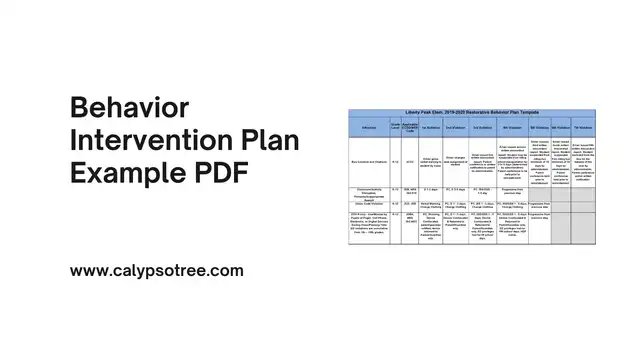A Solutions Architect is a key player in many industries. They help design and implement systems and solutions for businesses. This article gives solution architect job description examples. It will help you understand what a Solutions Architect does, the skills they need, their career path, and much more.
What is a Solutions Architect?
A Solutions Architect is a person who designs and plans how technology can help a business. They look at what a business needs and figure out the best way to use technology to meet those needs.
Benefits of Being a Solutions Architect
Being a Solutions Architect has many benefits. Here are some of them:
- Good Salary: Solutions Architects usually make a good salary. They are paid well for their skills and knowledge.
- Job Opportunities: There are many job opportunities for Solutions Architects. Different industries need their skills, like technology, finance, healthcare, retail, and government.
- Challenging Work: The job is interesting and challenging. Solutions Architects solve problems and create new solutions, which keeps the work exciting.
- Career Growth: There are many chances for career growth. Solutions Architects can move up to senior roles or management positions.
- Learning New Skills: Solutions Architects always learn new things. They need to stay updated with the latest technologies, which helps them grow their skills.
- Working with Teams: They get to work with many different people. This includes developers, project managers, and business analysts. Good teamwork makes the job rewarding.
A Solutions Architect plays a very important role in many companies. They design and plan how to use technology to help the business.
What Does a Solutions Architect Do?
A Solutions Architect has many responsibilities. They design technology solutions to meet business needs. They work with different teams to create a plan. They make sure the technology fits the company’s goals. They also help solve problems that come up during projects.
Primary Responsibilities of a Solutions Architect
These include:
- Designing systems and solutions
- Working with teams to create plans
- Making sure projects meet business goals
- Solving problems during projects
Required Skills for a Solutions Architect
They needs two types of skills: technical skills and soft skills. Both are very important for doing the job well.
Technical Skills:
- A Solutions Architect needs to know a lot about computers, including both the physical parts (hardware) and the programs that run on them (software).
- They need to know how to design systems that work well together. This means planning how different pieces of technology will fit and work together.
- They should have experience with many kinds of technology. This helps them choose the best tools for each job.
Soft Skills:
- Good Communication: Solutions Architects need to explain their ideas clearly. They talk with different teams and make sure everyone understands the plan.
- Problem-Solving: They need to find and fix problems that come up during projects. This means thinking quickly and finding the best solutions.
- Teamwork: Working well with others is very important. They need to work with many different people to get the job done.
Educational Background for a Solutions Architect
Most Solutions Architects have gone to college. They usually study subjects like computer science or information technology. These subjects teach them about computers and how they work.
Common Degrees:
- Computer Science: This degree teaches about programming and software.
- Information Technology: This degree focuses on how to use technology in businesses.
- Related Fields: Other useful fields include software engineering and systems analysis.
Besides a college degree, getting certifications can also be helpful. Certifications show that you have special skills and knowledge. They can make you stand out when looking for a job.
Popular Certifications:
- Microsoft Certified: Shows you know how to use Microsoft products.
- AWS Certified: Shows you know how to use Amazon Web Services (AWS).
Industries Employing Solutions Architects
Solutions Architects can work in many different industries. Here are some examples:
- Technology: This is one of the most common industries for Solutions Architects. They help design and build new technology systems.
- Finance: Banks and financial companies need Solutions Architects to help manage their computer systems. This helps keep customer information safe and makes financial transactions smooth.
- Healthcare: Hospitals and healthcare companies use technology to keep patient records and run equipment. Solutions Architects help design these systems to make sure they work well.
- Retail: Stores use technology to manage sales, track inventory, and more. Solutions Architects help create systems that make these tasks easier.
- Government: Government agencies use technology for many things, like keeping records and providing services. Solutions Architects help design systems that meet the needs of the public.
These industries need Solutions Architects to help them use technology to meet their goals. Solutions Architects make sure that technology is used in the best way to solve problems and improve services.
Career Path of a Solutions Architect
Becoming a Solutions Architect often starts with other jobs. These starting jobs help you learn important skills.
Starting Roles:
- Developer: As a developer, you write and fix code for software.
- Systems Analyst: As a systems analyst, you help design and improve computer systems.
After getting some experience, you can move up to be a Solutions Architect. As a Solutions Architect, you will design systems and solutions for businesses. You will work with different teams to make sure everything works well.
Advancing Your Career:
- Senior Solutions Architect: With more experience, you can become a senior Solutions Architect. This role involves more responsibility and bigger projects.
- Management Positions: Some Solutions Architects move into management. They might lead teams or departments. This role involves planning and overseeing projects.
In every step of the career path, learning new skills and staying updated with technology is important. This helps you grow and succeed in your job.
Average Salary Trends for Solutions Architects in 2024
The salary of a Solutions Architect can vary. On average, they make a good income. Factors like experience, location, and industry can affect their earnings.
Salary Estimates:
- Glassdoor: $170,000 – $270,000 per year (United States)
- Salary.com: $100,000 – $150,000 per year (United States)
- Levels.fyi: $160,000 – $220,000 per year (Amazon, United States)
- ZipRecruiter: $48 – $82 per hour (Texas)
References:
Note: These estimates are based on data from reputable sources. For more detailed information, you can visit the following links:
Tools and Technologies Used by Solutions Architects
Solutions Architects use many different tools and technologies to do their job. Here are some common ones:
Cloud Services:
- AWS (Amazon Web Services): This is a popular cloud service. It helps businesses store and manage data online.
- Azure: This is another cloud service, provided by Microsoft. It helps with storing data and running applications.
Programming Languages:
- Java: This is a programming language used to create software.
- Python: This is another programming language. It is easy to learn and very powerful.
Design Tools:
- UML (Unified Modeling Language): This tool helps Solutions Architects draw plans for software systems.
- Visio: This is a tool from Microsoft that helps create diagrams and charts.
These tools help Solutions Architects design, build, and manage technology solutions.
Solution Architect Job Description Examples
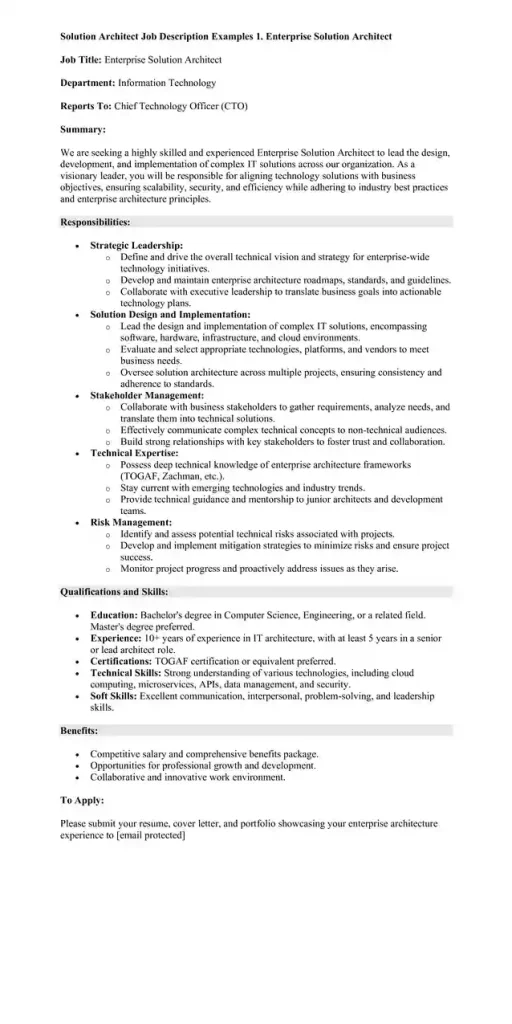
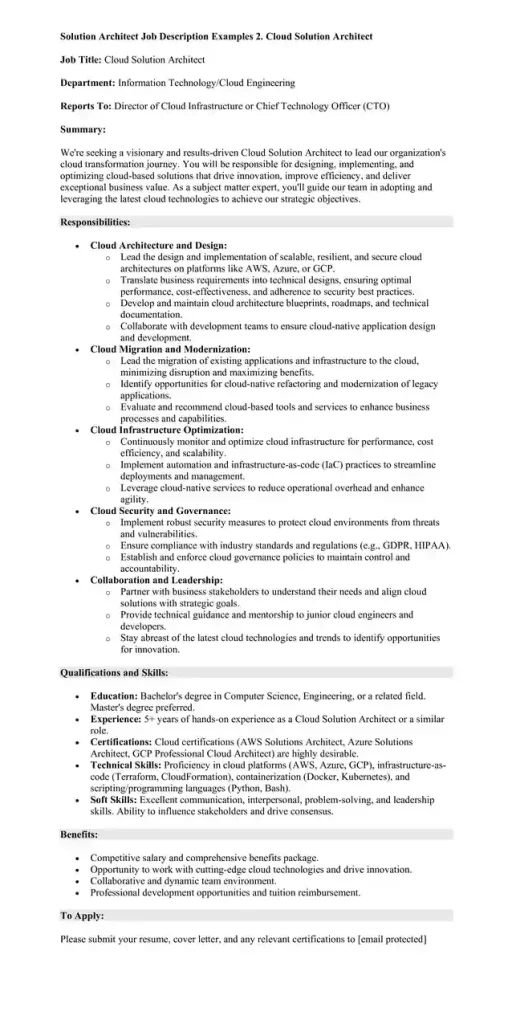
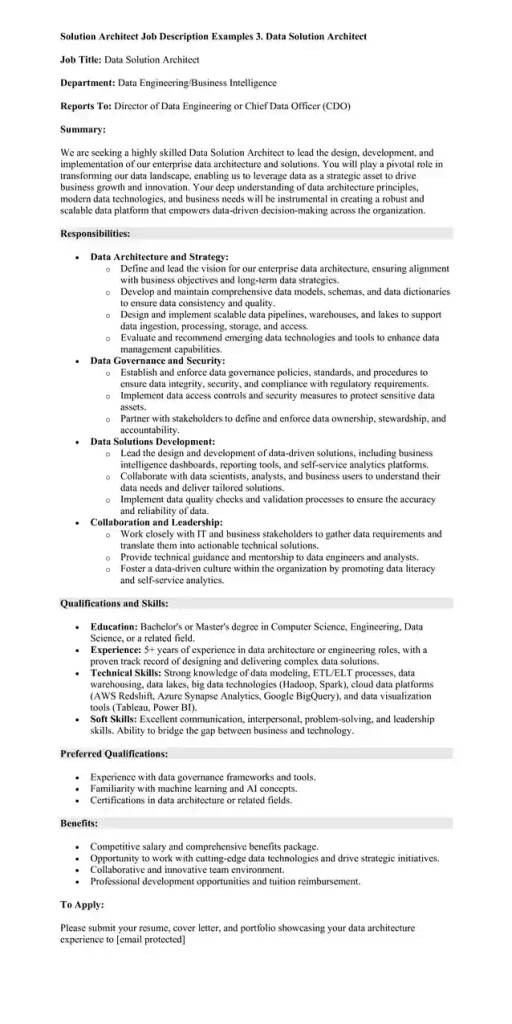
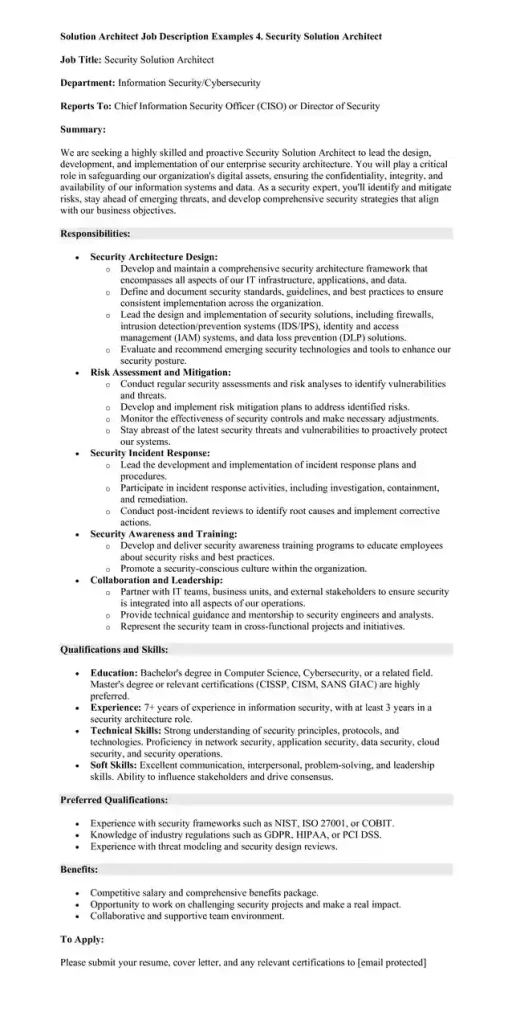
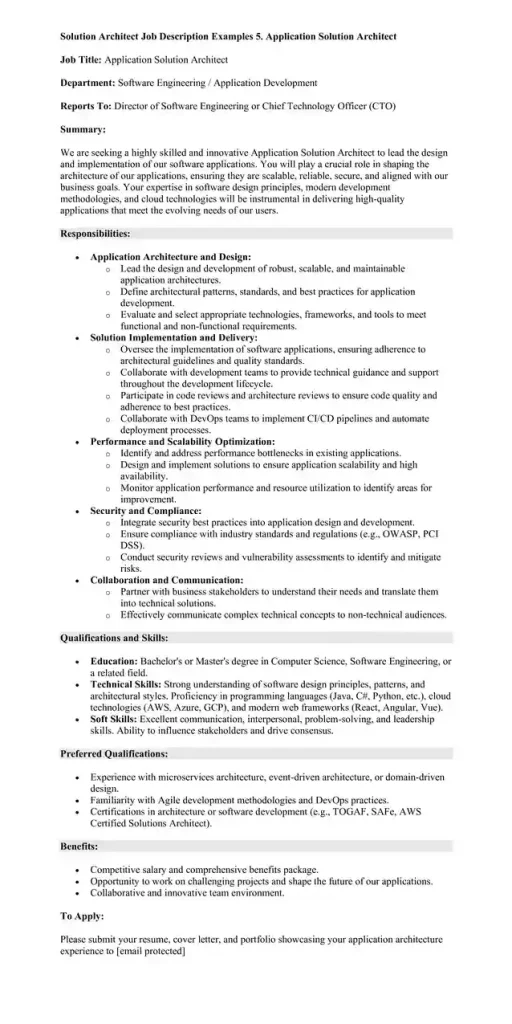
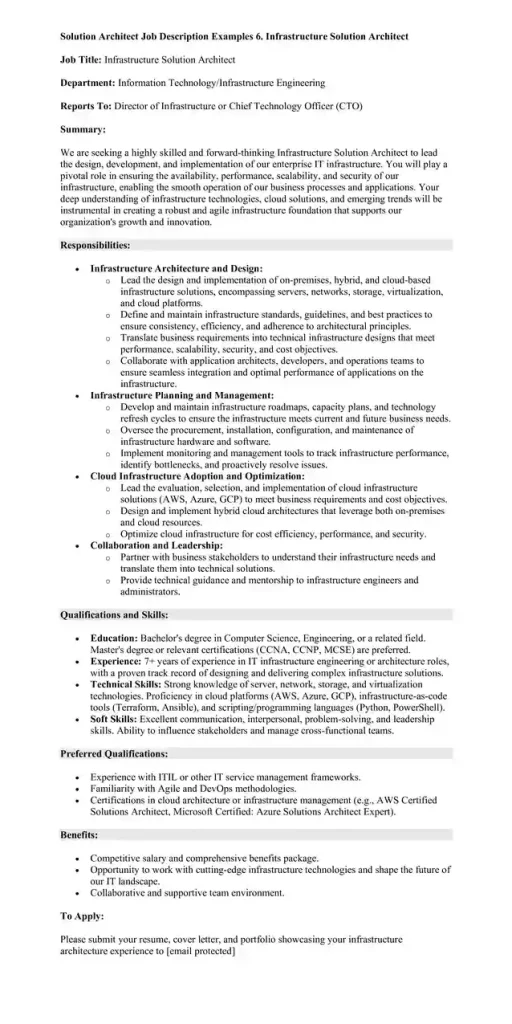
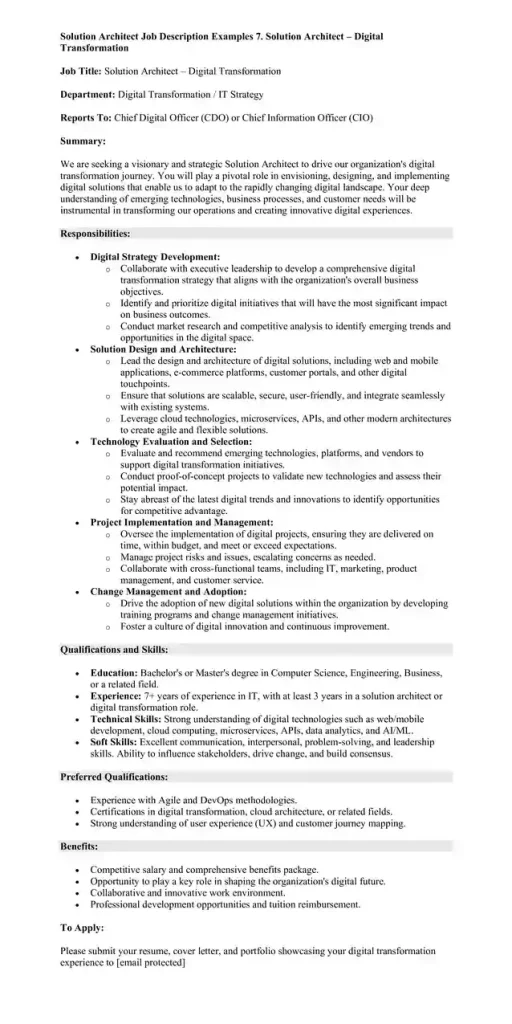
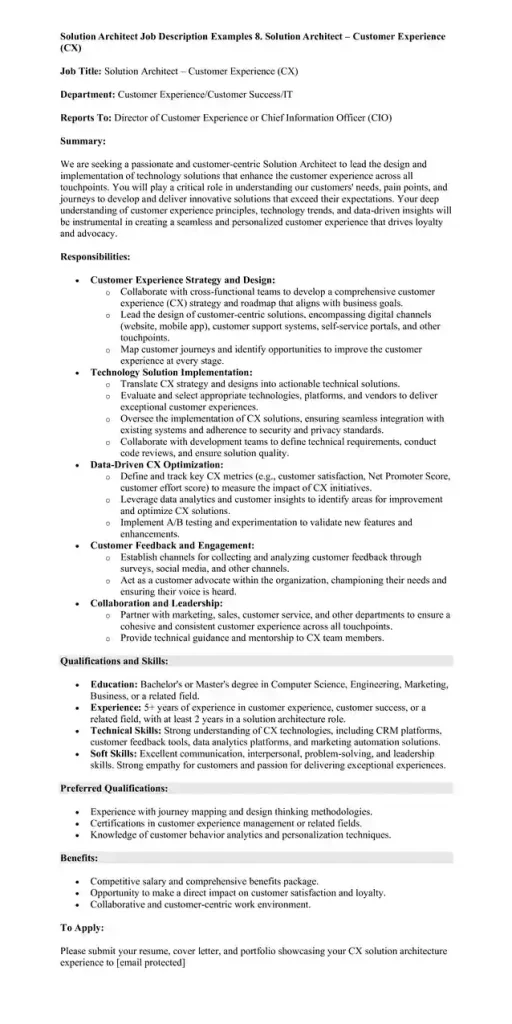
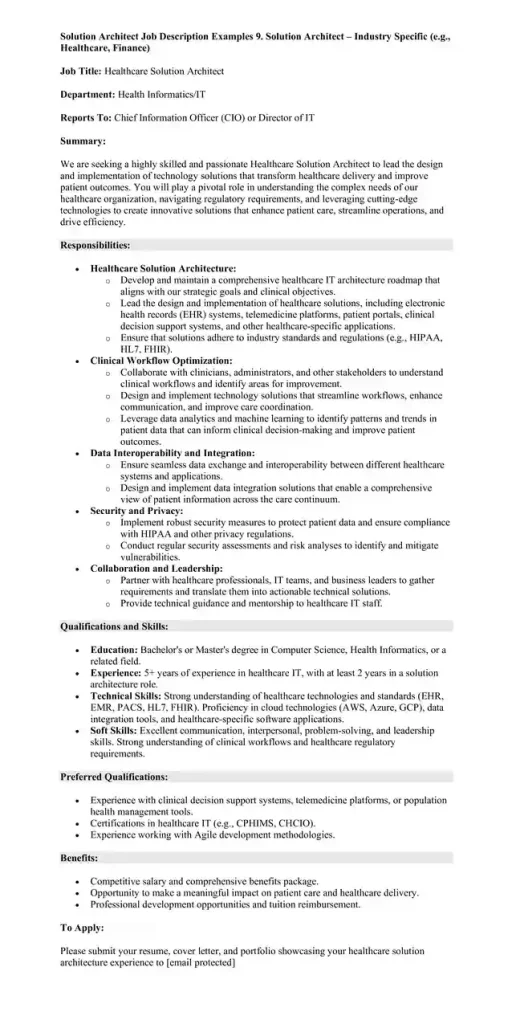
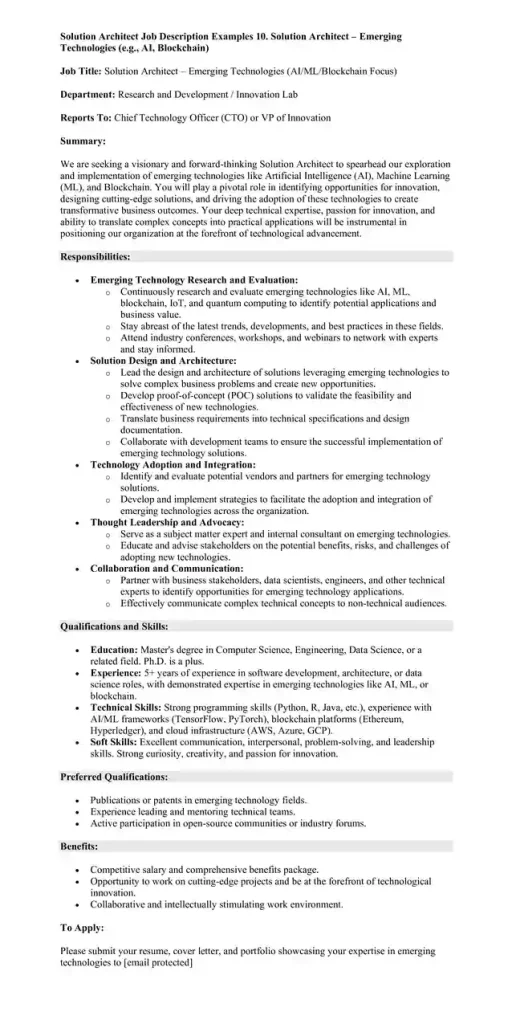
Interaction with Other Teams
A Solutions Architect works with many different teams. They need to be good at talking and working with others.
Teams They Work With:
- Developers: These are the people who write the code. The Solutions Architect explains what needs to be built and helps solve any technical problems.
- Project Managers: These people keep the project on track. They make sure things are done on time and within budget. The Solutions Architect works with them to make sure the plan is followed.
- Business Analysts: These people understand what the business needs. They help the Solutions Architect understand what the final solution should look like.
Importance of Good Communication:
- Clear Instructions: The Solutions Architect needs to give clear instructions to the developers so they know what to build.
- Teamwork: Working well with others is very important. The Solutions Architect needs to make sure everyone is working towards the same goal.
- Problem Solving: When problems come up, the Solutions Architect needs to talk with the team to find the best solution.
Challenges Faced by Solutions Architects
Being a Solutions Architect is not always easy. They face many challenges in their job. Here are some common ones:
- Complex Problems: Solutions Architects often have to solve tough problems. This can include fixing issues with technology or finding new ways to use it.
- Keeping Up with New Technologies: Technology changes fast. Solutions Architects need to stay up-to-date with the latest tools and trends. This helps them make the best choices for their projects.
- Meeting Business Needs: Solutions Architects must make sure their technology solutions fit the company’s goals. This means understanding what the business needs and finding the right technology to meet those needs.
Strategies to Overcome Challenges
Here are some ways Solutions Architects can deal with these challenges:
- Continuous Learning: Solutions Architects should always be learning. This can include taking classes, reading books, or going to conferences. Learning helps them stay current with new technologies.
- Effective Communication: Good communication is key. Solutions Architects need to talk clearly with their teams and explain their ideas well. This helps make sure everyone is on the same page.
- Strong Problem-Solving Skills: Being able to solve problems is very important. Solutions Architects should practice thinking quickly and finding the best solutions. This helps them overcome any challenges they face.
Interview Questions Solutions Architect
1. Can You Describe Your Experience as a Solutions Architect?
This question helps you understand their background and experience. Look for answers that include:
- The types of projects they have worked on.
- The industries they have experience in.
- Specific technologies they have used.
2. How Do You Approach Designing a New Solution?
This question helps you see their problem-solving skills. Look for answers that show:
- Their process for understanding the business needs.
- How they gather requirements from stakeholders.
- The steps they take to design a solution.
3. What Is Your Experience with Cloud Services Like AWS or Azure?
Cloud services are important for many businesses. This question helps you understand their knowledge of cloud technologies. Look for:
- Specific examples of projects using cloud services.
- Their understanding of cloud architecture.
- How they have implemented cloud solutions.
4. How Do You Ensure That Your Solutions Meet Business Goals?
This question focuses on their ability to align technology with business needs. Look for:
- Examples of how they have ensured solutions met business objectives.
- Their approach to working with business stakeholders.
- How they measure the success of their solutions.
5. Can You Give an Example of a Complex Problem You Solved?
Problem-solving is a key skill for a Solutions Architect. Look for:
- A clear description of the problem.
- The steps they took to solve it.
- The outcome of their solution.
6. How Do You Stay Updated with New Technologies?
Technology is always changing, and a good Solutions Architect stays current. Look for:
- Ways they keep their knowledge up to date.
- Examples of new technologies they have recently learned.
- How they apply new knowledge to their work.
7. How Do You Handle Conflicts or Disagreements Within Your Team?
Teamwork and communication are crucial for a Solutions Architect. Look for:
- Examples of conflicts they have resolved.
- Their approach to managing disagreements.
- How they ensure good communication within their team.
8. What Tools and Technologies Do You Prefer to Use?
Understanding their preferred tools can give you insight into their working style. Look for:
- Specific tools and technologies they use regularly.
- Reasons why they prefer these tools.
- How these tools help them in their work.
9. How Do You Balance Short-Term Needs with Long-Term Goals?
This question helps you understand their strategic thinking. Look for:
- Examples of how they have balanced short-term and long-term needs.
- Their approach to planning and prioritization.
- How they ensure solutions are scalable and sustainable.
10 Can You Explain a Time When a Project Did Not Go as Planned?
Not all projects go smoothly. This question helps you see how they handle challenges. Look for:
- A description of the project and what went wrong.
- How they managed the situation.
- What they learned from the experience.
Conclusion
A Solutions Architect is very important in many fields. They design technology solutions to help businesses. Knowing solution architect job description examples shows their value. Whether you want to be a Solutions Architect or work with one, understanding this role is helpful.

Alexander is a skilled HR expert who writes clear and compelling job descriptions. He has spent over 15 years in the HR field, helping companies find and keep the best employees. With a degree in Human Resources Management from the University of Chicago, he has the knowledge to back up his experience.







